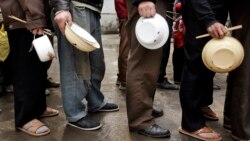“[Migrants] are scattered around the world,” U.S. Assistant Secretary of State for Population, Refugees, and Migration Anne Richard said in an editorial in recognition of United Nations’ migrants day. “They are often absent, but their efforts mean families can build houses, put children through school, and pay for medical care . . . [Yet] they are often the last people to be helped.”
Today there are 232 million migrants across the world. Their remittances totaled nearly $550 billion in 2013. They make tremendous contributions and sacrifices, but who is responsible for them when crises hit?
“The answer to that question is not clear,” said Ms. Richard. Even as migrants are increasingly more important to the global economy, there are few existing international frameworks or standards to assist migrants.
“The United States recognizes the important contribution migration has played in our own economy,” Assistant Secretary Richard said. “Migration drives economic development in both countries of origin and destination. Countries with aging populations and falling birth rates have come to rely on labor provided by the hardworking citizens from around the world.”
Alongside the many benefits, there are risks to the individuals who travel abroad for work. In addition to the manmade crises of war and instability, natural disasters have also left many migrants stranded.
“How can migrants be better protected?” Assistant Secretary Richard asked.
This was discussed at the United Nations High Level Dialogue on Migration and Development held in October 2013 in New York. A result was that the United States and the Philippines, in partnership with other governments and civil society organizations, would lead an initiative to address the protection of migrants.
“The goal . . . is to generate a set of guidelines to improve the ability of states and others to protect migrants caught in countries in acute crisis,” said Assistant Secretary Richard. “Countries should begin taking their own actions now, such as by requiring employers to assist in crisis, creating contingency plans with international organizations . . . and giving their embassies specific responsibilities to help their migrant communities. The millions of people helping [to] drive global development deserve no less.”
Today there are 232 million migrants across the world. Their remittances totaled nearly $550 billion in 2013. They make tremendous contributions and sacrifices, but who is responsible for them when crises hit?
“The answer to that question is not clear,” said Ms. Richard. Even as migrants are increasingly more important to the global economy, there are few existing international frameworks or standards to assist migrants.
“The United States recognizes the important contribution migration has played in our own economy,” Assistant Secretary Richard said. “Migration drives economic development in both countries of origin and destination. Countries with aging populations and falling birth rates have come to rely on labor provided by the hardworking citizens from around the world.”
Alongside the many benefits, there are risks to the individuals who travel abroad for work. In addition to the manmade crises of war and instability, natural disasters have also left many migrants stranded.
“How can migrants be better protected?” Assistant Secretary Richard asked.
This was discussed at the United Nations High Level Dialogue on Migration and Development held in October 2013 in New York. A result was that the United States and the Philippines, in partnership with other governments and civil society organizations, would lead an initiative to address the protection of migrants.
“The goal . . . is to generate a set of guidelines to improve the ability of states and others to protect migrants caught in countries in acute crisis,” said Assistant Secretary Richard. “Countries should begin taking their own actions now, such as by requiring employers to assist in crisis, creating contingency plans with international organizations . . . and giving their embassies specific responsibilities to help their migrant communities. The millions of people helping [to] drive global development deserve no less.”

















